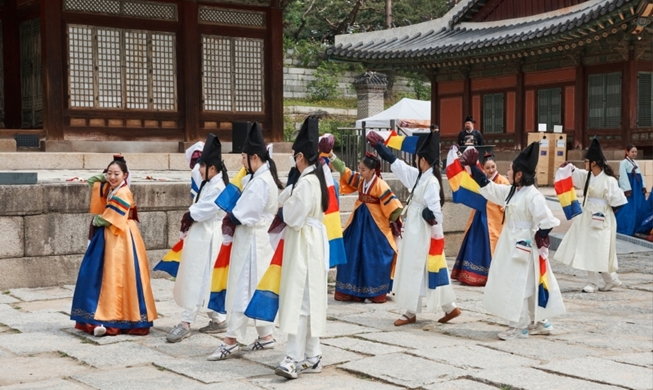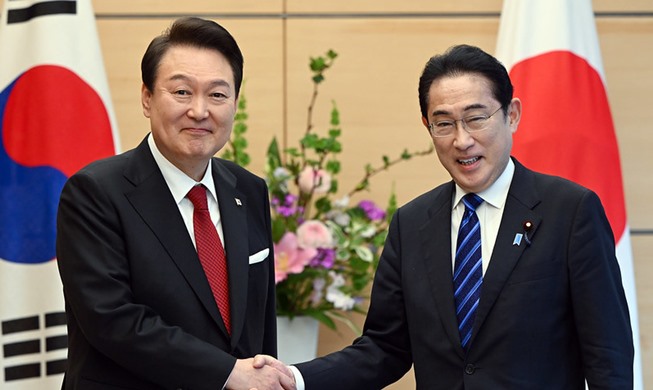-
 Korea.net's 24-hour YouTube channel
Korea.net's 24-hour YouTube channel- NEWS FOCUS
- ABOUT KOREA
- EVENTS
- RESOURCES
- GOVERNMENT
- ABOUT US
“I liked mountains and the people who were with me,” said Kim Young-mi with a smile when asked why she became a mountain climber.
Kim unveiled a shiny smile when talking about mountains. She suffered freezing cold temperatures, below minus 40 Celsius, and the hardships of climbing mountains as high as a few thousand kilometers. In 2008, when she was in her 20s, she made a record by climbing the world's Seven Summits, the highest mountains on each of the seven continents. Not many professional mountain climbers have achieved that record so far. Those who have the record include the late Park Young-seok (1963-2011), a famous mountaineer who became the first person in the world to complete an Explorers Grand Slam -- the seven summits, plus the North and South Pole -- as well as Oh Eun-sun and Kim Hong-bin.
“When I look down after climbing to the top, I can see what I couldn’t see from down below. Mountains give me such lessons all the time,” said Kim. She added that mountains are like teachers of life.
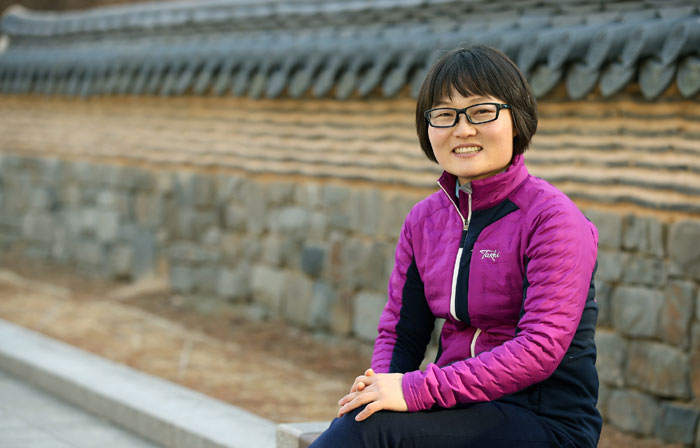
Apart from mountain climbing, Kim is also good at other extreme sports. She is an excellent skier and long-distance cycler. Last year, she completed a 15,000-kilometer bicycle tour, "One Korea, New Eurasia,” a bike route that stretches from Berlin to Seoul, the only female member of the team. “Riding a bike or skiing is all part of training to better climb mountains,” said Kim.
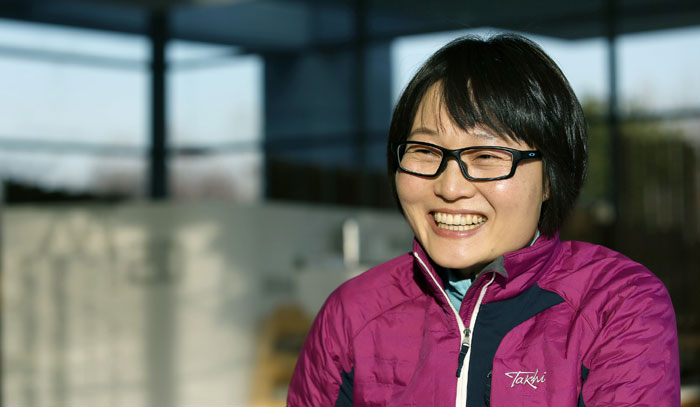
Why does she keep summiting mountains, even though it is tough and dangerous? Kim knows better than anyone else that risk always exists in mountain climbing. When people lose focus or lack the physical strength and in a split second miss their footing, they could lose their lives.
“When I saw my team members lose their lives, after all teaming up together, I was so shocked. It took a long time for me to recover from the accident,” said Kim with tears.
Despite the danger and pain of mountaineering, she reveals her affection for the mountains by saying, “There are so many mountains to which I wish to go in the future. I’ve been resting at the moment and concentrating on training in order to climb more mountains, for longer.”
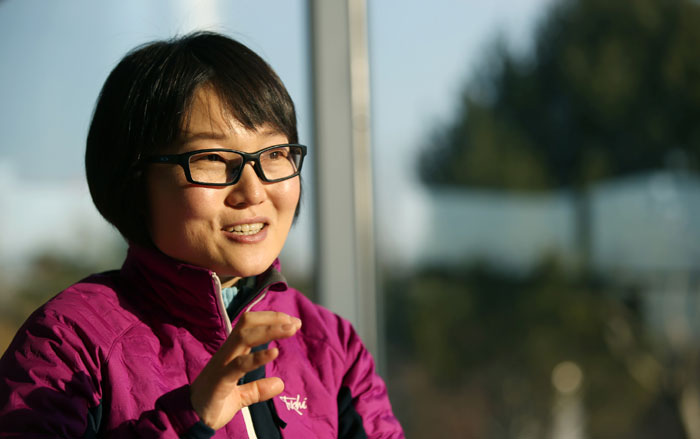
Korea.net sat down with Kim to learn more about her life in the mountains and episodes of her mountaineering career which has spanned more than 15 years.
Article by Yoon Sojung
Photos: Jeon Han
Korea.net Staff Writers
arete@korea.kr
Kim unveiled a shiny smile when talking about mountains. She suffered freezing cold temperatures, below minus 40 Celsius, and the hardships of climbing mountains as high as a few thousand kilometers. In 2008, when she was in her 20s, she made a record by climbing the world's Seven Summits, the highest mountains on each of the seven continents. Not many professional mountain climbers have achieved that record so far. Those who have the record include the late Park Young-seok (1963-2011), a famous mountaineer who became the first person in the world to complete an Explorers Grand Slam -- the seven summits, plus the North and South Pole -- as well as Oh Eun-sun and Kim Hong-bin.
“When I look down after climbing to the top, I can see what I couldn’t see from down below. Mountains give me such lessons all the time,” said Kim. She added that mountains are like teachers of life.

Kim Young-mi summited the world's Seven Summits at the age of 28 in 2008. Last year, she rode the 15,000-kilometer "One Korea, New Eurasia” bike route that stretches from Berlin to Seoul.
Apart from mountain climbing, Kim is also good at other extreme sports. She is an excellent skier and long-distance cycler. Last year, she completed a 15,000-kilometer bicycle tour, "One Korea, New Eurasia,” a bike route that stretches from Berlin to Seoul, the only female member of the team. “Riding a bike or skiing is all part of training to better climb mountains,” said Kim.

‘When talking about mountains, I get so excited,’ says Kim with a bright smile.
Why does she keep summiting mountains, even though it is tough and dangerous? Kim knows better than anyone else that risk always exists in mountain climbing. When people lose focus or lack the physical strength and in a split second miss their footing, they could lose their lives.
“When I saw my team members lose their lives, after all teaming up together, I was so shocked. It took a long time for me to recover from the accident,” said Kim with tears.
Despite the danger and pain of mountaineering, she reveals her affection for the mountains by saying, “There are so many mountains to which I wish to go in the future. I’ve been resting at the moment and concentrating on training in order to climb more mountains, for longer.”

'The important thing lies not in reaching the top, but in the process of discovering and finding the mountain,' says Kim.
Korea.net sat down with Kim to learn more about her life in the mountains and episodes of her mountaineering career which has spanned more than 15 years.
- You successfully completed the 15,000-kilometer "New Eurasia" bicycle expedition last year. It took more than three months and you were the only female member of the team. Were there any difficulties? If yes, how did you get over them?
There were no specific difficulties just because I was the only woman. Everything involved the people who did the journey with me. If we had different opinions or conflicts, it could be hard, but we could still solve it through dialogue and understanding. When I first began the journey, I felt it was new to ride a bike across flat land, because I was used to climbing high mountains.
- Where does your energy come from?
I believe it comes from my relationship with people. When I came back to Korea from Mt. Everest in 2008 after successfully climbing the world's Seven Summits, my family and relatives held my hands, hugged me and touched my cheeks. I felt how warm their hands were, while thinking, “I went such a long way to feel their warmth.”
- When did you first begin climbing? What made you choose to include mountaineering in your life?
I lived in Yongpyeong, Gangwon-do (Gangwon Province), until I finish high school. For me, the mountains were a natural part of living and playing as a kid. When I graduated from university, I thought I should do something to make my heart beat faster and realize the meaning of life. Mountains were my answer. For me, mountains are the tools that make me learn about life and the way to live a life.
- What is the most impressive mountain for you? Or on the contrary, what was the most difficult mountaineering course for you?
I would say Gasherbrum II (8,035 meters) in Pakistan. This is the 12th highest mountain in the world. I went there four times, which is rare. When I went there for the first and second time, I did not climb to the peak because I thought I needed more training to do so. On my third visit, Go Mi-young fell off the hill after reaching the top of Nanga Parbat on her way to reach the 8,000-meter peak for the 14th time. We all withdrew from the mountain. When I got there for the fourth time, we were asked for help by a team of Taiwanese climbers who headed to the mountain earlier and they requested a rescue. We saved them and got down together safely. I have no regrets for not climbing to the peak because we saved people’s lives, which is the most important.
- What was the most memorable moment, looking back on your life of mountaineering?
Two or three years ago, when I climbed Amphu 1 (6,840 meters) in the Himalayas, I found a big lake along the way. It was amazing that such a big, peaceful lake existed at such altitudes. A feeling of relief rushed over me like a flood, as if I lost all my strength when I got down after climbing and arrived at the base camp. We usually have no words because we get nervous and try to focus on climbing when up on the mountain. At that moment, however, I was able to make facial expressions and smile at each other at last.
- Some regard mountain climbing as a hard or dangerous thing to do. What is the reason that people go to the mountains?
I guess mountains have special energy. It is not appropriate to consider a mountain as a target to make a record or as a subject of conquest. We should go to the mountain to feel something and then come back. When climbing to the peak of a mountain, I discover how precious the small things are which I couldn’t realize before. I guess people head to the mountains for such reasons.
- What are the charms of mountain climbing, in your view?
I think mountain climbing is a form of composite art because it requires everything -- mental and physical strength, good weather and good equipment. In the mountain climbing club I joined in university, the most important values among the club members were humbleness and honesty. These values taught us to lower ourselves without arrogance in front of the mountains. When climbing up, I can learn a new lesson about nature.
- Where would you recommend mountain loving international tourists in Korea visit?
In Seoul, Bukhansan Mountain would be the one, as we can get there by public transport, such as subway. If they have more time, I would recommend Seoraksan Mountain because it is my favorite and because people can also visit the National Mountain Museum in Sokcho. If they can stay longer, I would also recommend Hallasan Mountain.
- Who are your role models?
I would say my seniors in the mountain climbing club at university who taught me about mountains when I knew nothing about them. Those teachers are not far away from us. For me, climbing mountains together while getting drenched in sweat is a very precious memory.
Article by Yoon Sojung
Photos: Jeon Han
Korea.net Staff Writers
arete@korea.kr
Most popular
- China warmly welcomes first Korea-born giant panda Fu Bao
- First hearing-impaired K-pop act hopes for 'barrier-free world'
- Novelist Hwang's 'Mater 2-10' shortlisted for Int'l Booker Prize
- Expats could account for 7% of population in 20 years: report
- Nat'l Fire Agency picks 137 elite staff for deployment abroad








